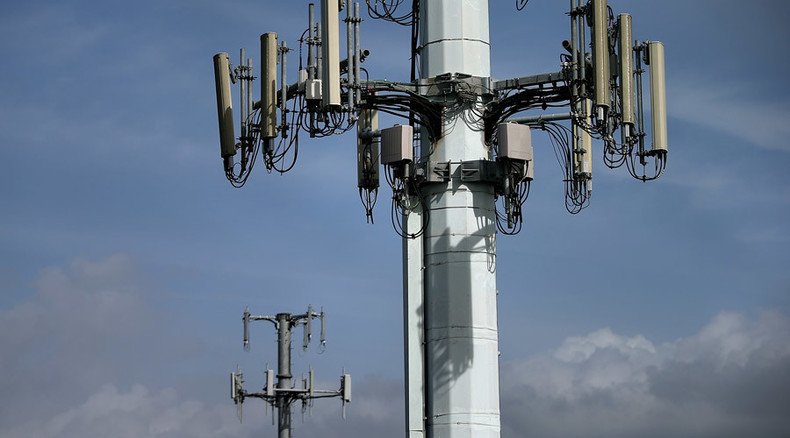‘Intrusive’ and ‘secretive’: ACLU obtains government docs on Stingray surveillance

The ACLU has acquired the Justice Department’s guidelines on the use of Stingray technology, showing the surveillance tools are capable of tracking targets, recording and listening in on calls – even of innocent parties – and bugging.
“The government is using intrusive new forms of technology to invade our privacy but it is shrouding its practices in secrecy, and Stingrays are a very poignant example of that,” Linda Lye, senior staff attorney with the Northern California American Civil Liberties Union, told RT.
“We shouldn’t have to surrender our privacy merely by using the modern conveniences of daily modern life like a cell phone.”
The documents confirm long-held suspicions that the controversial devices, which mimic cell phone towers and trick cell phones into thinking it is a legitimate tower, are capable of recording the numbers of a mobile phone’s incoming and outgoing calls, as well as intercepting the content of voice and text communications.
“The public and courts and criminal defendants have a right to know when the government is using intrusive new forms of technology. It raises cutting edge legal questions, like what kind of court authorization does the government need to get before it uses this technology?” Lye added.
According to the documents, the devices “may be capable of intercepting the contents of communications, and therefore, such devices must be configured to disable the interception function, unless interceptions have been authorized by a Title III order.”
Title III is a federal wiretapping law that allows law enforcement, with a court order, to intercept communications in real time.
Docs obtained by @ACLU confirm #Stingrays are also capable of intercepting CONTENTS of voice and text communications https://t.co/zBHcI3b9ok
— Anonymous (@AnonyOps) October 28, 2015The documents also discussed the possibility of “flashing” a phone’s firmware “so that you can intercept conversations using a suspect’s cell phone as a bug.”
The ACLU filed a Freedom of Information Act lawsuit against the Department of Justice two years ago to force it to disclose its policies and procedures concerning Stingrays.
“By withholding information about this technology from courts in applications for electronic surveillance orders, the federal government is essentially seeking to write its own search warrants while engaging in a form of dragnet surveillance,” argued the ACLU in the complaint.
The documents, numbering over 70 pages, show the government had not been upfront about how the surveillance tool was being used by law enforcement, and that it was capable of spying on innocent bystanders.
“Stingrays … scoop up information not only from the target the government is investigating, but also third parties as to whom that the government has no reasonable cause or suspicion about whatsoever. That means innocent bystanders are having their rights compromised,” said Lye.
Police ‘#Stingray’ devices can jam cell phone service - report http://t.co/rvNi4UcGappic.twitter.com/m8Dnr7eKUK
— RT America (@RT_America) March 3, 2015The surveillance tools go by a number of different names – Wolfpack, Gossamer, and swamp box – and are generally the size of a suitcase. They work by emitting a stronger signal than nearby towers in order to force a phone or mobile device to connect to them instead of a legitimate tower.
The Stingrays can be used to determine the location of phones, computers, and wireless PC data cards, also known as air cards, according to Wired. Once a mobile device connects and reveals its unique device ID, law enforcement can use a handheld device that can track a phone or mobile device, including pinpointing an exact office or apartment where it is being used.
Concerns about the use of Stingrays have been mounting as of late. The ACLU has identified 57 agencies that own stingrays or similar devices in 22 states and the District of Columbia.
In addition, federal rules don’t apply to local police departments, which purchase the Stingrays independently of the federal government and are among the most prolific users of the technology. They have been using them without obtaining warrants for years.
The Baltimore Sun reported that city police have used the technology 4,300 times since 2007, often without obtaining a search warrant. Defense attorneys and prosecutors are currently reviewing thousands of criminal cases involving the trackers.
'Stingray' surveillance tech used in Baltimore for everyday policing – report http://t.co/qWyadYUcVZpic.twitter.com/U5PFxci0P5
— RT America (@RT_America) August 25, 2015The Department of Homeland Security and the Justice Department, which oversees the FBI, now require their agents to obtain a warrant based on probable cause before using the device in most cases.
Lye told RT that the courts serve as an “important, independent arbitrator to determine whether investigators have met probable cause that warrants invading privacy.” She said that applying for a warrant is a time-tested method for balancing government’s legitimate need to investigate in the name of public safety and the public’s need for privacy.
“The Fourth Amendment of the Constitution requires the government to get a warrant before it searches someone’s phone or seizes someone’s property. The reason we have that is before we adopted that provision, the British would engage in general searches anywhere they pleased in order to look for violations of British customs laws,” Lye said.
“Stingrays engage in the electronic equivalent of a general search. They search not only the target of an investigation but innocent third parties, and that kind of privacy intrusion is not what the framers intended.”
Need stingray surveillance? Get a warrant! California gov signs landmark privacy law http://t.co/eV1F9MTyEdpic.twitter.com/thwg1Kgeoh
— RT America (@RT_America) October 9, 2015Congress is also concerned. Representative Jason Chaffetz (R-Utah) said he plans to introduce a bill criminalizing any use of a Stingray without a warrant. The bill would apply to state and local agencies as well as federal ones.
The Washington Examiner was given a draft copy of the bill and reported that violations would be punishable by a fine and up to 10 years in prison, but that it includes wide exemptions, including for situations involving “emergencies that include an ‘immediate danger of death,’ national security or ... the Foreign Intelligence Surveillance Act.”











